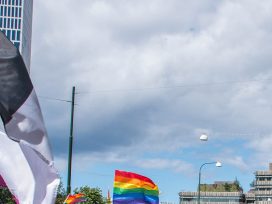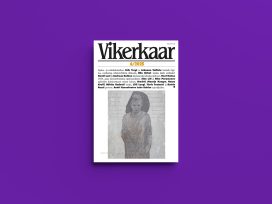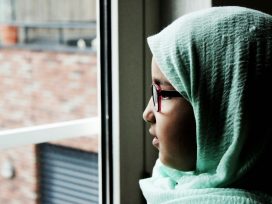The twentieth century left deep and unhealed wounds in the memory of almost all the nations of eastern and central Europe, with its revolutions, uprisings, two World Wars, the Nazi occupation, the inconceivable horror of the Holocaust. Then there was the huge number of local wars and conflicts, most of which had a pronounced national flavour: tin he Baltic States, Poland, western Ukraine and the Balkans. We witnessed a string of dictatorships of different ilk, each unceremoniously depriving people of their civic and political liberty, foisting upon them instead a standard system of values binding on all. National independence was in succession gained and lost, and gained again, with this for the most part being seen within the framework of ethnic self-identification. And each time, this or that community felt insulted and humiliated.
This is our shared history. Yet each national group remembers and perceives it’s own history in its own way. National memory refashions and interprets this shared history in its own way. For this reason, each national group has its own twentieth century.
Contradicting histories, parallel realities
Obviously, any “collective image of the past” is a loose and abstract category. Yet this abstraction is embodied in entirely specific things; in public political and moral assessments of historical events, in cultural life, in the content of education, in state policy and in inter-ethnic and international relations.
The bitterness of old mutual grievances can long poison relations between ethnic groups, unless they have leaders like Vaclav Havel, who, having become President of Czechoslovakia, found the courage (despite the mood at the time of most of his fellow citizens) to publicly apologize to the Germans expelled after the war from the Sudeten region and their descendants.
Such symbolic gestures are fully capable if not of putting an end to mutual grievances of different groups, then of significantly softening their force. Unfortunately, people of the moral calibre of Vaclav Havel seldom become national leaders. We are aware that there is no judge who would be able to hand down an independent and unbiased verdict on the past. In almost every one of the various images of the past generated by national memory, one can see both the wish to justify one’s own national group, and a fragment of the historical truth. This latter is most clear specifically for that national group and less noticeable to its neighbours. Differences in historical assessments are a reality that to try to blur is senseless and dangerous. It is not sufficient to simply bear this reality in mind; we need to try to understand it.
At present, disputes on historical issues arise less over the facts themselves, as over how these are interpreted. An honest attempt to understand this or that event, phenomenon or process requires in the first instance consideration within a specific historical context. However the very choice of this context often generates assessments that are difficult to reconcile. For example, the return of Vilnius and the area around it to Lithuania in autumn 1939, after the forced separation of this territory from the Lithuanian state in 1920 and its subsequent annexation by Poland, looks like an act restoring justice. Yet this looks entirely different if viewed within the context of the Molotov-Ribbentrop Pact and the accompanying secret protocols, the destruction of Poland under the double blow from the West and the East, and other realities of the first weeks of the Second World War. A similar multitude of assessments is implicit in a whole range of territorial reapportioning, “annexations” and “restorations” of those years.
What is 17 September 1939 for Poles? It is a day marking a national tragedy, when the country resisting with its last breath the Nazi aggression was suddenly subjected to an unprovoked invasion from the East. This is historic fact and no references to the injustice of the pre-war borders or the Soviet Union’s need to defend its western borders can remove the Stalinist leadership’s burden of responsibility for their complicity in the Nazi aggression against Poland.
However, for a significant part of the Ukrainian people this day has an extra meaning, since it marks the uniting of the Ukrainian lands into a single whole, albeit within the USSR.
Do Ukrainians have the right to a different approach from Poles to these events? They do, yet both Poles and Ukrainians are entitled to expect understanding from each other and respect for their different memories.
How should one view the events of 1944 when the Soviet Army drove the Germans out of Lithuania, Estonia and most of Latvia? As the liberation of the Baltic State from the Nazis? As an important step towards the final victory over Nazism? Undoubtedly, and this is precisely how the events are perceived in the world. In Russia the perception is especially strong, with it forming part of the basis of national self-awareness.
Yet for Estonians, Latvians and Lithuanians, the military victories of the Soviet Army also meant the return of their countries into the USSR, which in 1940 had deprived them of their national independence. It spelled the restoration of a regime which over 11 months from July 1940 to June 1941 had made its mark through huge numbers of arrests and politically motivated charges, the deportation of tens of thousands to Siberia and Kazakhstan and the extrajudicial executions of prisoners in the first days of the war. The immediate future, as became finally clear in the autumn of 1944, held in store forced collectivization, new arrests and new deportations on a mass scale. Do citizens of Russia and the other republics of the USSR have the right to be proud of the Soviet Army’s military successes in 1941? Without any doubt: this right was paid for with the blood of hundreds of thousands of soldiers.
Yet while not in any way waiving that legitimate pride, they should know and understand what these successes also brought the Baltic nations as well as liberation from Nazism. The latter, in their turn, while remembering their tragic history, should remember and understand what the memory of the great struggle of the nations against Nazism meant for Russia and for all humanity.
“Museums of the Soviet Occupation” have recently opened in Georgia and Ukraine. This has aroused bemusement and irritation in most Russian citizens. In Russia, only specialist historians know about the existence of a Georgian Democratic Republic from 1918 to 1921 and about the attempts from 1918 to 1920 to create an independent Ukrainian National Republic, as well as about the role of the Red Army in their liquidation. Yet in the countries themselves, the memory of their independent existence as states in the twentieth century, albeit for a short period, has never fully been erased. It is entirely natural that the will is now emerging there to rethink the events of 1920 and 1921.
One can disagree with some conclusions that are made in the process. You can argue with those historians and lawyers who derive present Ukrainian or Georgian statehood from the events of 1918. You can emphatically argue with those inclined to view the entire history of these countries from the end of the Civil War to 1991 as a period of “occupation”. However society in Russia, the country which many are used to regarding as responsible for everything that the Soviet regime did, should be aware of the discussions about the past developing in their neighbouring countries. It should treat such discussions with understanding, and not respond merely with newspaper satire and cartoons.
At the same time, one would like Ukrainian and Georgian society to acknowledge that the fact that in Russia there is no automatic consensus with the hard-hitting epithets sometimes applied in Georgia or Ukraine to some key episodes in our joint history does not necessarily demonstrate “Great Russian chauvinism” and “enduring stereotypes of imperialist consciousness.”
This applies to assessments of the armed partisan resistance to the communist regime during the post-war years in western Ukraine, in Lithuania, Latvia, Estonia and Poland. The memory of the resistance movements, as a rule, is complex and dramatic and cannot fail to generate a multitude of very different judgments, including the most radical. Some are inclined to unquestioning glorification of “the freedom fighters”, for others it is desperately difficult to part with the usual ideas about “bandits”. One can find arguments without difficulty for any point of view. Those arguing are not able to convince one another even when the dispute takes place within one country. When the debate becomes merged with national and state ambitions and political passions, one can probably not hope to achieve balanced and mutually acceptable judgments. However we can and must move from arguments and mutual insults to a civilized exchange of opinions.
The list of examples when the memory of one people comes into conflict with the memory of another could be continued. There is absolutely nothing bad in these contradictions; on the contrary, if we treat them with proper understanding they enrich the historical consciousness of each group and make our understanding of the past more comprehensive.
The Soviet legacy
In the area of history with which Memorial is involved, the history of the Soviet State terror, this difference in assessments and understanding has proved no less painful than in other fields. Not recognized or understood, or seen in a hypocritical and superficial manner, the tragedies of the past become the basis for new historical and political myths, influence national mentalities, distort them and bring countries and national groups into conflict.
In almost all countries of the former socialist bloc, the forms of historical and political reflection flourishing are those which represent “their” suffering purely as the result of ill will from “others”. Dictatorship and terror are presented in the first instance as aimed against the nation, and those who carry them out as “foreigners” or foreign puppets. The fact that the communist regimes in those countries were for many years propped up not only by Soviet bayonets, but by certain internal resources, is gradually erased from the national memory.
At the same time, past events are judged ever more harshly in historical and legal terms. For example, standard fare in the political lexicon of a whole number of post-communist countries is the word “genocide”. We recognize that extreme assessments of this kind often have some historical truth. Yet we assume that partial truth is always dangerous, in the first instance for those who are prepared to accept it as historical truth in its entirety.
The cultivation of an image of one’s own people as “victims”, and the elevation of high human losses to the rank of national dignity are organically linked with the abdication of responsibility and the personification of the image of the “executioner” in a neighbour. This is the natural result of the reflex-level need people have to remove from themselves the overly burdensome weight of civic responsibility for the past. However, waiving any responsibility and placing it all upon one’s neighbour is not only a poor foundation for mutual understanding between nations, but it is also bad for one’s own national revival.
For Russia, the history of the collapse Soviet Union cannot be separated from its own history – this is the awareness of most of its citizens. Partly for that reason, and partly because Russia declared itself the successor to the USSR, for a number of neighbouring nations, it becomes a convenient object on which to lay historical liability. These nations quite unequivocally identify today’s Russia with Stalin’s USSR and point to it as a source of its national tragedies.
Russia, for its part, has found a particular means of easing the burden placed by history on the national groups which went through totalitarianism. Instead of honest attempts to come to an understanding of twentieth century history in its tragic entirety, and instead of a serious nationwide discussion about the Soviet past, the patriotic Soviet myth with small changes is being revived. This myth views Russian history as a string of glorious and heroic achievements. In it, there is barely room for guilt or responsibility or acknowledgement of the very fact of the tragedy. However, heroism and self-sacrifice does not give rise to civic responsibility. As a result, many Russian citizens are simply incapable of understanding either the level of historical responsibility of the Soviet Union towards the neighbours of modern Russia, or the scale of the catastrophe for Russia itself. The rejection of memory, its replacement by a crude picture of an empire where, “from Moldovan to Finn, in all languages each is silent, for they thrive”, poses for Russia no less a public danger than the cultivation of national grievances does for its neighbours.
Responsibility for one’s own history
Let it be repeated: in themselves, national differences in the interpretation of important historical events are natural and inevitable. We must simply understand clearly how to behave with regard to these differences.
One should obviously not reject one’s own understand of history for the sake of “political correctness”, yet nor should one foist one’s own truth upon one’s neighbours.
It is senseless to ignore “another” memory, to pretend that it does not exist; it is senseless to deny its justification, declaring all the facts and interpretations it is based on totally false.
One must not infer from the suffering and misfortune of one’s own people a kind of moral superiority over other peoples who supposedly (or in actual fact) did not suffer so much, nor use this suffering as political capital, converting it into lists of grievances to present to neighbouring countries and peoples.
One must under no circumstances try to exploit discrepancies in “national images of the past” or try to turn the specific features of national memory into a reason for inter-ethnic enmity and inter-governmental conflict.
Today, it is unproductive and dangerous to divide nations into “victims” and “executioners” and to assess the past in categories of “historical guilt” of some towards others. Crucial here is not that contemporary legal thinking rejects the concept of collective, let alone inherited, guilt for a crime (we do not touch upon issues connected with legal liability of states before their own or foreign nationals). We are convinced that in order to come to a serious understanding of the past and to find a way out of the dead end of historical contradictions, the main thing is not to seek culprits, but to encourage civic responsibility, taken voluntarily by individuals upon themselves, feeling themselves to be members of a historically formed community for the actions committed in the name of that community. If a people are united not only by everyday civic and political existence, but by a shared past and the for a shared future, then the concept of civic responsibility naturally extends to national history. It is specifically civic responsibility for one’s own history, and not the great achievements and major catastrophes as such which make a group in the fullest sense a nation – a society of fellow citizens.
This responsibility is not work which can be done once and for all. Each nation must return to its past again and again. Again and again, with each new generation, it must understand and reassess this past, not turning away from its bitter and terrible pages. It must develop its own reading of history – and clearly understand with this that others have the right to their own, different reading. Moreover, each nation must aspire to recognize the neighbour’s images of the past and understand the historical reality behind them. Not to adopt, but to understand; not to replace one’s own truth with another, but to supplement and enrich one’s own view of the past.
Recognising contradictions
Unfortunately, history is becoming before our very eyes an instrument to achieve immediate political gain, a club in the hands of people who essentially have no interest in the national memory of other nations, nor in the tragedies experienced by their own people, nor in the past in general. The recent events surrounding the memorial to Soviet soldiers in Tallinn clearly demonstrated the lack of civic responsibility among politicians both in Estonia and in Russia. The Bronze Soldier controversy is a clear illustration of the possible consequences of differences in national images of the past if the dispute about history assumes the form of a “conflict of memories”.
There will clearly always be people wanting to stir up this conflict for political dividends – at the expense of their own people, at the expense of other nations and at the expense of all normal citizens. However society as a whole beard responsibility for such a course of events, since conflict becomes possible only where there is a lack of good-willed and interested dialogue.
What can society use to oppose old-fashioned prejudice, mutual intolerance, self-interest and the narrow mindedness of politicians?
We believe that the only way of overcoming the increasing divide between nations is free, unbiased and civilized exchange of opinions on all issues of our common history eliciting disagreements. The purpose of this exchange of opinions is not to fully eradicate differences, but merely to better learn and try to understand each other’s point of view. If we reach a shared view of some painful issue linked with our past, so much the better. If we don’t, no matter, each of us will remain with our own understanding, but we will learn to also see and understand the images of the past in the consciousness of our neighbours. The only conditions for dialogue must be the participants’ willingness to respect the other’s point of view, however “incorrect” it may seem at first glance, along with genuine interest in this point of view and the sincere desire to understand it. For this dialogue, we need to create the corresponding mechanism, a discussion platform of its kind.
For an international historical forum
Memorial calls on all those interested in a substantive and good-willed discussion on the issues linked with our common past to take part in creating an international historical forum. We view such a forum as a free association of civic organizations, research centres, and cultural and educational institutions, within which there will be an ongoing exchange of views regarding historical conflicts in our region in the twentieth century.
Clearly, the forum cannot be closed for individual researchers, publicists and other interested individuals. And of course we would hope that both the “dominant” and “dissident” historical viewpoints within any given society would be represented, with the exception of those interpretations based on overt homophobic, fascist or racist value systems.
The state of national memory in the countries of central and eastern Europe is interesting and important in the first instance for the peoples of this region, however not only for them. So-called “old Europe” is today turning into a new Europe. Almost all the countries of the region have joined or hope to join common European structures. Together with them, historical issues, traumas and complexes enter European culture and the shared European memory. The experience of post-communist countries (including not only “geographical” Europe, but also Kazakhstan and the countries of the Caucasus and Central Asia) present a challenge for all Europeans. This needs to be worked on and understood. Our envisaged dialogue is merely part of a common European, and in the final analysis, a common human dialogue about the past. Furthermore, learning and coming to understand the twentieth century experienced by many peoples in western Europe, Latin America and other regions of the world, we have encountered issues similar to those which we face now, and it would be very important to know how these issues were and are being resolved. We therefore hope that the topics and participants in the forum will not be strictly restricted to our region alone.
We suggest that the specific forms of organization of the dialogue be a special Internet site, a series of “face to face” bilateral and multilateral thematic conferences, attended not only by professional historians (who already carry out an exchange of views within the academic community), but lawyers, sociologists, journalists, activists from civic organizations and others. We propose that all who support our idea and are ready to participate in achieving it, work together on preparing it. This also applies to various products of the Forum’s activities, including joint periodicals and joint preparation of textbook materials through which the youth in each of our countries can become familiar with the “national image of the past” common among neighbouring countries and peoples.
The historical forum that we are proposing will undoubtedly promote the development of mutual understanding between its participants – individuals and organizations representing different countries and different traditions of interpreting the past. However we hope that it will also become one of the ways towards mutual understand between our countries and peoples.
We must do this in order that our common tragic memories bring nations closer rather than dividing them. We have the chance to achieve this if we agree to work on understanding our past together and not in isolation.
March, 2008






